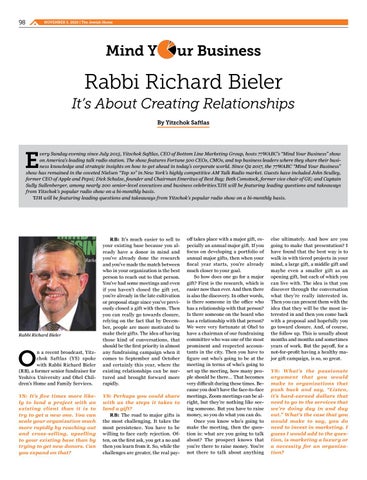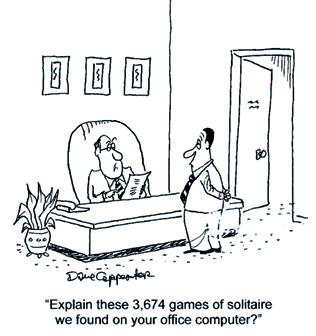98 58
NOVEMBER 5, 2020 | The Jewish Home OCTOBER 29, 2015 | The Jewish Home
Mind Y
ur Business
Rabbi Richard Bieler It’s About Creating Relationships By Yitzchok Saftlas
E
very Sunday evening since July 2015, Yitzchok Saftlas, CEO of Bottom Line Marketing Group, hosts 77WABC’s “Mind Your Business” show on America’s leading talk radio station. The show features Fortune 500 CEOs, CMOs, and top business leaders where they share their business knowledge and strategic insights on how to get ahead in today’s corporate world. Since Q2 2017, the 77WABC “Mind Your Business” show has remained in the coveted Nielsen “Top 10” in New York’s highly competitive AM Talk Radio market. Guests have included John Sculley, former CEO of Apple and Pepsi; Dick Schulze, founder and Chairman Emeritus of Best Buy; Beth Comstock, former vice chair of GE; and Captain Sully Sullenberger, among nearly 200 senior-level executives and business celebrities.TJH will be featuring leading questions and takeaways from Yitzchok’s popular radio show on a bi-monthly basis. TJH will be featuring leading questions and takeaways from Yitzchok’s popular radio show on a bi-monthly basis.
n a recent broadcast, Yitzchok Saftlas (YS) spoke with Rabbi Richard Bieler (RB), a former senior fundraiser for Yeshiva University and Ohel Children’s Home and Family Services.
RB: It’s much easier to sell to your existing base because you already have a donor in mind and you’ve already done the research and you’ve made the match between who in your organization is the best person to reach out to that person. You’ve had some meetings and even if you haven’t closed the gift yet, you’re already in the late cultivation or proposal stage since you’ve previously closed a gift with them. Then you can really go towards closure, relying on the fact that by December, people are more motivated to make their gifts. The idea of having those kind of conversations, that should be the first priority in almost any fundraising campaign when it comes to September and October and certainly this year, where the existing relationships can be nurtured and brought forward more rapidly.
YS: It’s five times more likely to land a project with an existing client than it is to try to get a new one. You can scale your organization much more rapidly by reaching out and cross-selling, upselling to your existing base than by trying to get new donors. Can you expand on that?
YS: Perhaps you could share with us the steps it takes to land a gift? RB: The road to major gifts is the most challenging. It takes the most persistence. You have to be willing to face early rejection. Often, on the first ask, you get a no and then you learn from it. So, while the challenges are greater, the real pay-
Rabbi Richard Bieler
O
off takes place with a major gift, especially an annual major gift. If you focus on developing a portfolio of annual major gifts, then when your fiscal year starts, you’re already much closer to your goal. So how does one go for a major gift? First is the research, which is easier now than ever. And then there is also the discovery. In other words, is there someone in the office who has a relationship with that person? Is there someone on the board who has a relationship with that person? We were very fortunate at Ohel to have a chairman of our fundraising committee who was one of the most prominent and respected accountants in the city. Then you have to figure out who’s going to be at the meeting in terms of who’s going to set up the meeting, how many people should be there… That becomes very difficult during these times. Because you don’t have the face-to-face meetings, Zoom meetings can be alright, but they’re nothing like seeing someone. But you have to raise money, so you do what you can do. Once you know who’s going to make the meeting, then the question is: what are you going to talk about? The prospect knows that you’re there to raise money. You’re not there to talk about anything
else ultimately. And how are you going to make that presentation? I have found that the best way is to walk in with tiered projects in your mind, a large gift, a middle gift and maybe even a smaller gift as an opening gift, but each of which you can live with. The idea is that you discover through the conversation what they’re really interested in. Then you can present them with the idea that they will be the most interested in and then you come back with a proposal and hopefully you go toward closure. And, of course, the follow up. This is usually about months and months and sometimes years of work. But the payoff, for a not-for-profit having a healthy major gift campaign, is so, so great. YS: What’s the passionate argument that you would make to organizations that push back and say, “Listen, it’s hard-earned dollars that need to go to the services that we’re doing day in and day out.” What’s the case that you would make to say, you do need to invest in marketing. I guess I would add to the question, is marketing a luxury or a necessity for an organization?
























